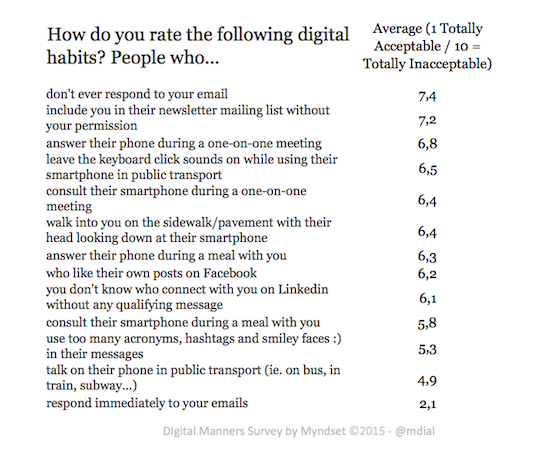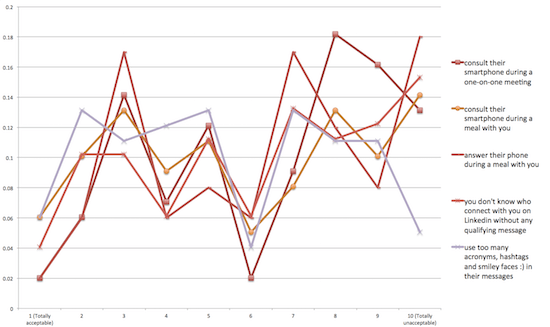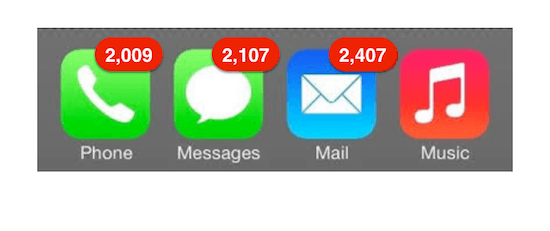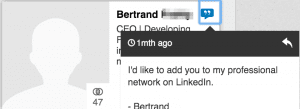It’s true that my peers and I (as well as plenty of those that followed) went to school with any more than (at best) access to a computer. So how is society to self-educate? With parents that haven’t been trained, we are supposed to be setting the course. But, it is most disconcerting to see how digital manners have taken a back seat, even among the “more mature” people (and parents). Where and how are we supposed to know how to operate? What is the right digital etiquette? I have discussed this topic with many people — and I suspect it is discussed in many informal moments around the world among all age groups. I feel that there is a real need for us all to take stock of how we are using our devices. As impressive and indispensable as these new technologies may be, there are ways to use them that are more acceptable than others. Certainly, there are some cultural and generational perceptions that will alter our sensitivities. I’m certainly not asking for total disconnection. However, I think we need to improve our general awareness of how we act, the habits we are forming and the messages we are conveying to others around us Share on X A lot of this has to do with our mobile etiquette, but there are plenty of other platforms out there — including email and social media — that are a constant cause for consternation.
Etiquette Matters
I sent out this survey a week ago — with 13 questions — and managed to get nearly 150 answers. I’d be glad to have you take the survey, if you wish, by clicking here: Survey Monkey.
The digital manners questionnaire
How do you rate the following digital habits? People who…

When you look at this questionnaire, there are at least three different types of reactions:
- now, that is one I really hate
- for this one, it totally depends
- whoops, that’s one I do all the time…
Do you agree? Any other reactions out there?
Among the surprises for me in the survey, it’s considered more unacceptable to consult or answer your smartphone in a one-on-one meetingversus at a meal. Predictably, it’s worse to answer than the phone than to consult the smartphone.
One of the challenges is that we are not aware of how badly we are acting around others. Sometimes it is because we plain don’t care. Other times, it is because we have not, as a society, come to an agreement. There can be many mitigating circumstances. For the following five questions, the spread of answers attests to a very uncertain position. For each of these questions, the answers were spread out, in a band between 2% and 18%. Moreover, for a couple of items, the very same behavior was either quite acceptable (2-3) or quite unacceptable (7-8).

The fact is that there are many ways to get irritated by the way people are using the digital devices and platforms. The challenge is that we are without a moral compass per se in our digital manners. Beyond the digital manners, there is a fundamental issue of mental hygiene (to avoid burnout) and societal fabric (greater empathy). More than just complaining I think we also need to establish the right codes.
Improving your own digital manners
Here are a couple of measures that people can take to improve their own digital manners and hygiene.

- Unanswered Messages. Take stock of the number of unanswered messages you have. Especially on the mobile, you will need to get a grip on the messages on your smartphone as THAT is the future Share on X Of course, the synchronization is far from seamless across different operating systems, but it behooves us all to get on top of it. Get help from a geek if you need it!
- LinkedIn etiquette. You probably receive many invitations on LinkedIn just like below. No photo and a template request: “I’d like to add you to my professional network on LinkedIn.” Aside from not knowing this particular person, the lack of an image certainly doesn’t help jog the memory… Nor does it encourage a greater sense of confidence. May I petition that we take the time to add a qualifying clause why we should be connected? [I know that LinkedIn’s tool makes it easy to be sloppy… but we should try to avoid being lazy and impersonal all the same].

We all need to improve our digital manners! #etiquette. Please Retweet! Share on X
Other resources
- Slate published a podcast that lasted two years (2011-2012) and features 50 different episodes on digital manners.
- A standard for mobile manners (published on The Myndset in 2014)
[Photo credit: EKG Technician Salary]
Happy to hear your comments and thoughts!











Trackbacks/Pingbacks